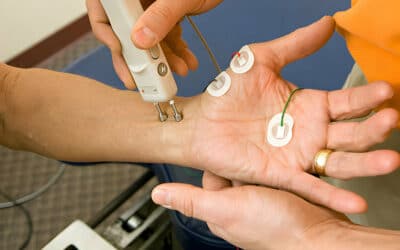Radiculopathy is one of the conditions causing neck or back pain. We all know how difficult it can be to deal with back pain, and it can take weeks or months to get it under control. Some conditions even cause chronic consequences, where the only thing people have left is taking medications to manage pain intensity.
Read on to learn more about radiculopathy, its symptoms, and what causes this painful condition.
What Is Radiculopathy?
Radiculopathy is a condition that causes back or neck pain. There are three types of radiculopathy depending on the affected area:
- Cervical radiculopathy (affects the neck)
- Thoracic radiculopathy (affects the upper or middle back)
- Lumbar radiculopathy (affects the lower back)
Luckily, radiculopathy is a temporary issue, and most cases can be resolved without surgery.
What Causes Radiculopathy
Radiculopathy is a condition caused by a pinched nerve in your spine. The most common case occurs when one of your nerve roots gets compressed or irritated. We differentiate the three mentioned types of radiculopathy depending on where the affected nerve is located.
This condition can affect anyone, regardless of sex or age. However, it is more common in older adults, as they are more susceptible to other disorders that can cause a pinched nerve. That includes:
- Herniated discs – When a spinal disc that normally protects vertebrae slips out of place, it can compress or damage nearby nerves. A herniated disc usually occurs in the lower back and causes lumbar radiculopathy, also known as sciatica.
- Spinal stenosis – This condition is characterized by thickening of the spinal ligaments, which causes the narrowing of the spinal canal. Spinal stenosis can cause nerve root compression and radiculopathy onset.
- Bone spurs – Bone spurs are areas of extra bone growth that can develop due to osteoarthritis, injury, or degenerative conditions. The excess bone tissue can press on the nerves, causing radiculopathy.
What Are the Symptoms of Radiculopathy?
The compression of a nerve leads to inflammation or damage, resulting in several symptoms:
- Sharp pain in the back, neck, arms, legs, or shoulders
- Pain that becomes worse with certain activities
- Muscle weakness in arms or legs
- Numbness or tingling sensations in arms and legs
Symptoms can vary in type and intensity depending on the affected nerve and may also occur in bursts. Some people don’t even experience symptoms with mild cases of radiculopathy.
How Is Radiculopathy Diagnosed?
If your doctor suspects your symptoms are caused by radiculopathy, they’d first perform a physical exam. Then, they need to take imaging tests that may include a CT scan, X-ray, or MRI. In addition, they may take nerve function tests such as electromyography to detect the problematic nerve.
After the diagnosis, your doctor will discuss treatment options with you.
Space City Pain Specialists Can Help With Radiculopathy
If you are looking for a radiculopathy treatment in Webster, TX, Space City Pain Specialists can help. Our team of certified experts has helped thousands of people manage painful conditions, and they can do the same for you.
Click here to schedule an appointment and say goodbye to pain.



